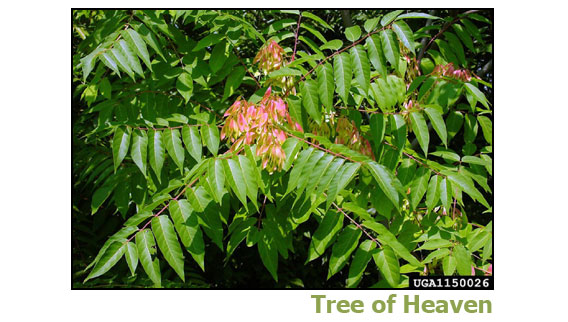

Tree-of-heaven
Photo credit: Chuck Bargeron, University of Georgia, Bugwood.org
What is it?
A deciduous tree up to 80 feet tall with compound leaves that resemble native sumac and walnut species. Although once used as an ornamental, the flowers, leaves, and wood all give off an offensive odor likened to rotting peanuts.
Where's it from?
China
How did it get here?
Deliberately introduced as an ornamental species
Where is it now?
It is found in 43 states, and throughout Virginia, growing in numerous habitats, from the interior of large National Parks to the center of cities. Tree-of-heaven produces numerous wind-born seeds that allow it to invade naturally disturbed sites in natural areas. It is one of the most widespread weed trees in roadsides and in Shenandoah National Park.
What's the harm?
It is a fast-growing tree that can damage pipes and other structures in the urban landscape and outcompete native plant species in natural areas. It produces a chemical inhibiting the growth of other plants, giving it a competitive advantage.
What's being done?
Control with herbicides is effective and appropriate on a small scale, and high priority areas such as Shenandoah National Park have actively tried to eliminate it where practical. In addition, promising biological controls are being explored.
 Virginia Invasive Species
Virginia Invasive Species